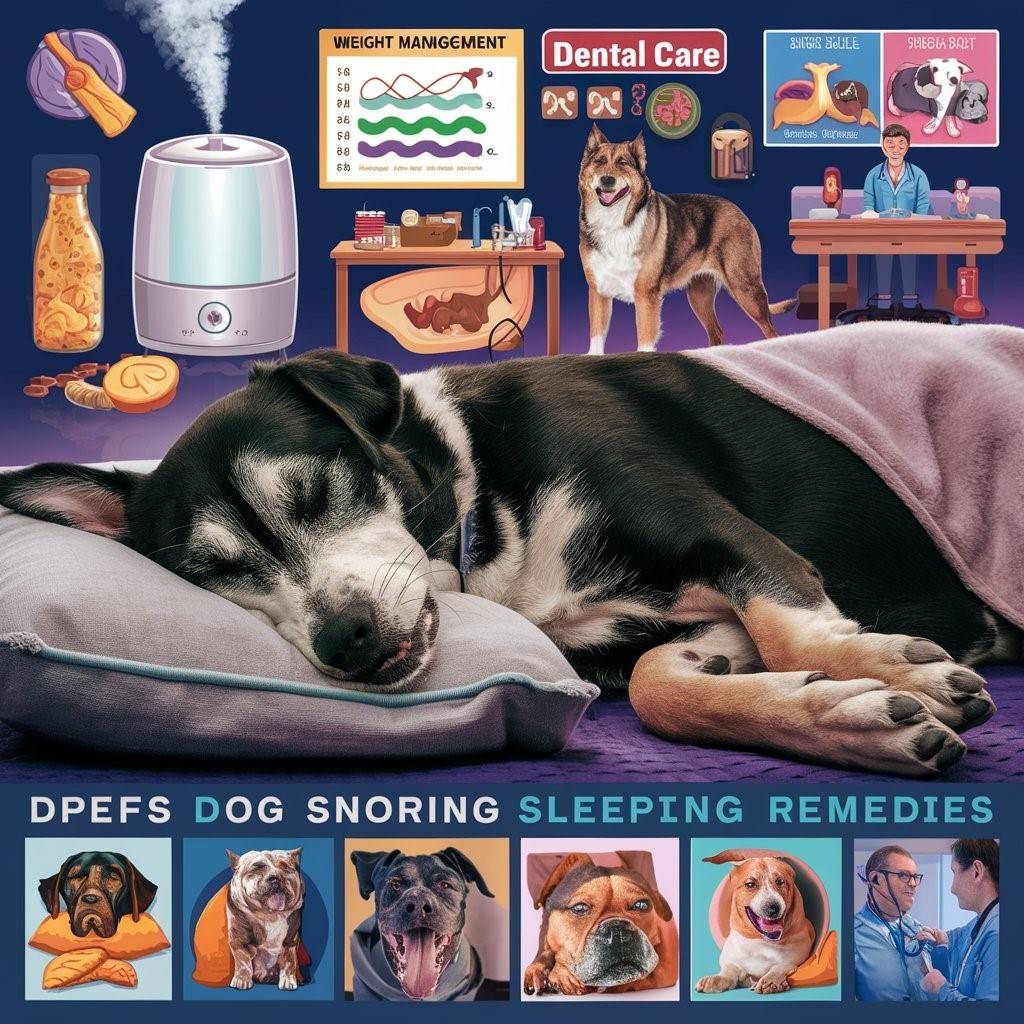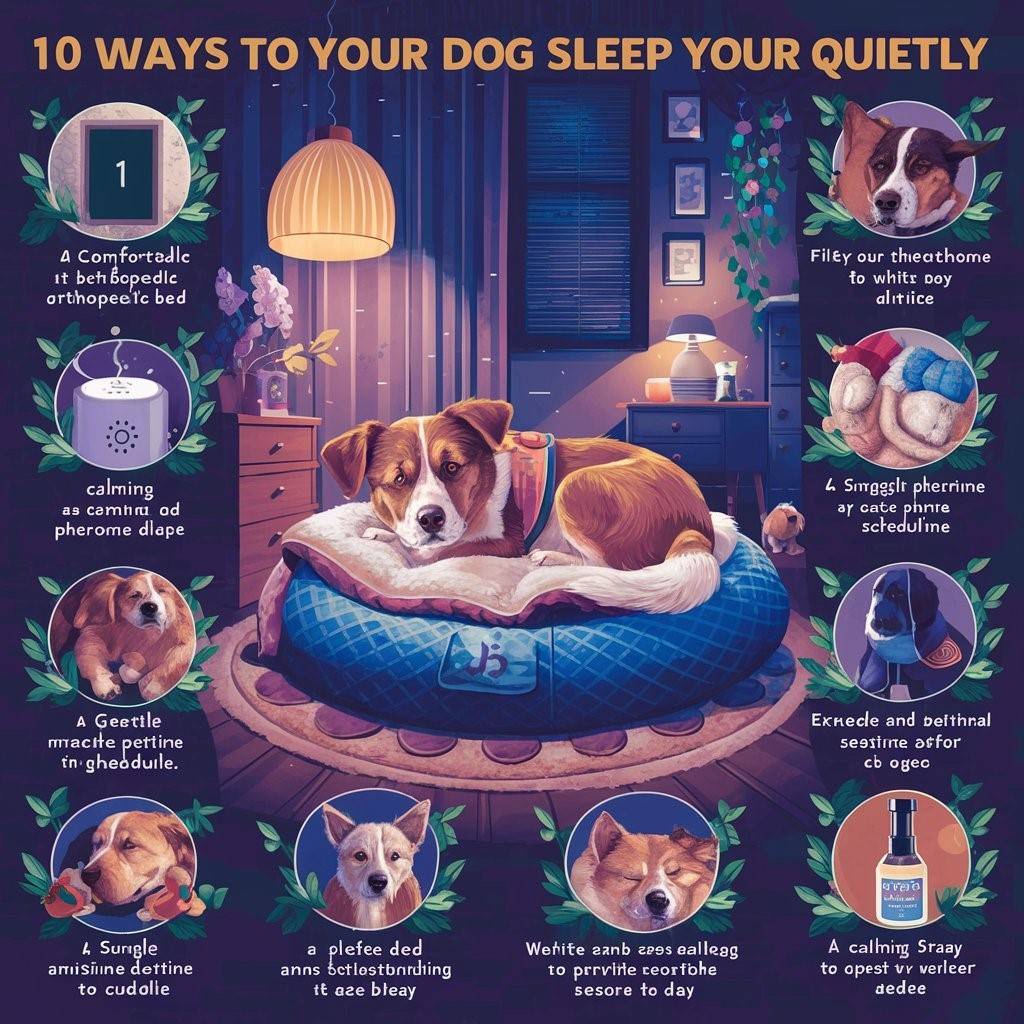Dog Snoring Remedies: 10 Ways to Help Your Pup Sleep Quietly
As a dog owner, you know that your furry friend’s snoring can be just as disruptive as a human’s. While some snoring is normal, excessive snoring can indicate underlying health issues or discomfort. Fortunately, there are several dog snoring remedies. You can help your pup sleep more quietly and comfortably. In this article, we’ll explore 10 effective dog snoring remedies to promote a peaceful night’s rest for both you and your canine companion.
Understanding Dog Snoring
Before diving into dog snoring remedies, it’s essential to understand why dogs snore. Some common causes of snoring in dogs include:
- Obesity
- Allergies
- Sleep position.
- Dental health issues
- Anatomical features (e.g., short snouts, elongated soft palates)
By identifying the underlying cause of your dog’s snoring, you can better target your dog snoring remedies for optimal results.
10 Effective Dog Snoring Remedies

- Weight management: Obesity is a common cause of snoring in dogs. Excess weight can put pressure on your dog’s respiratory system, leading to snoring. Helping your dog maintain a healthy weight through a balanced diet and regular exercise is one of the most effective dog snoring remedies.
- Humidifier: Dry air can irritate your dog’s nasal passages and throat, contributing to snoring. Using a humidifier in your dog’s sleeping area can help keep the air moist and reduce snoring.
- Adjust sleeping position: Encourage your dog to sleep on their side rather than their back. Sleeping on the back can cause the tongue and soft tissues to collapse into the airway, leading to snoring. Providing a supportive, comfortable bed can help promote side sleeping.
- Allergy management: Allergies can cause inflammation in your dog’s airways, leading to snoring. Work with your veterinarian to identify and manage any allergies to medications, environmental changes, or dietary adjustments.
- Dental health: Poor dental health, such as tooth decay or gum disease, can contribute to snoring in dogs. Regular dental check-ups and cleanings can help maintain your dog’s oral health and reduce snoring.
- Nasal strips: Nasal strips, like those used by humans, can help open your dog’s nasal passages and reduce snoring. Consult with your veterinarian to ensure proper fit and use.
- Elevated sleeping surface: Raising your dog’s head and neck during sleep can help keep their airway open and reduce snoring. Consider using a wedge pillow or an elevated dog bed to promote better breathing.
- Air purifier: Allergens and irritants in the air can contribute to snoring in dogs. Using an air purifier in your dog’s sleeping area can help remove these particles and promote easier breathing.
- Surgical intervention: In severe cases of snoring, surgical intervention may be necessary to correct anatomical issues such as elongated soft palates or collapsed nostrils. Consult with your veterinarian to determine if surgery is the right option for your dog.
- Regular check-ups: Regular veterinary check-ups can help identify and address any underlying health issues that may be contributing to your dog’s snoring. Early intervention can help prevent more serious health problems down the line.
| Cause of Snoring | Dog Snoring Remedies |
| Obesity | Weight management through balanced diet and exercise |
| Allergies | Allergy management through medications, environmental changes, or dietary adjustments |
| Sleep position | Encouraging side sleeping with a supportive, comfortable bed |
| Dental health | Regular dental check-ups and cleanings |
| Anatomical features | Surgical intervention (in severe cases) to correct elongated soft palates or collapsed nostrils |
Implementing Dog Snoring Remedies

When implementing dog snoring remedies, it’s essential to be patient and consistent. Some remedies, such as weight loss or allergy management, may take time to show results. Here are some tips for successfully implementing dog snoring remedies:
- Work closely with your veterinarian to develop a personalized treatment plan.
- Make gradual changes to your dog’s diet and exercise routine.
- Create a comfortable, sleep-conducive environment for your dog.
- Be consistent with any medications or therapies prescribed by your veterinarian.
- Monitor your dog’s progress and adjust your approach as needed
Remember, every dog is unique, and what works for one may not work for another. Be willing to try different dog snoring remedies until you find the right combination for your furry friend.
When to Seek Veterinary Help
While some snoring is normal, excessive or loud snoring can be a sign of an underlying health issue. If your dog’s snoring is accompanied by other symptoms, such as difficulty breathing, coughing, or lethargy, it’s essential to seek veterinary help right away. Your veterinarian can perform a thorough examination and recommend the appropriate dog snoring remedies based on your dog’s specific needs.
Frequently Asked Questions
How can I make my dog stop snoring?
To help your dog stop snoring, try the following dog snoring remedies:
- Manage your dog’s weight through a balanced diet and regular exercise.
- Use a humidifier in your dog’s sleeping area.
- Encourage your dog to sleep on their side.
- Manage any allergies to medications or environmental changes.
- Maintain your dog’s dental health with regular check-ups and cleanings.
- Consider using nasal strips or an elevated sleeping surface.
Why does my dog snore so much when sleeping?
Dogs may snore excessively because of various factors, including:
- Obesity
- Allergies
- Sleep position (sleeping on the back)
- Dental health issues
- Anatomical features (short snouts, elongated soft palates)
Consult with your veterinarian to identify the underlying cause of your dog’s snoring and determine the best dog snoring remedies.
Can I give my dog Benadryl for snoring?
While Benadryl may help alleviate some allergy-related snoring in dogs, it should only be given under the guidance of a veterinarian. Benadryl can cause side effects and may not be appropriate for all dogs. Always consult with your veterinarian before giving your dog any medications.
Is there medicine for dogs that snore?
There is no specific medicine designed to treat snoring in dogs. However, your veterinarian may prescribe medications to address underlying conditions that contribute to snoring, such as allergies or respiratory issues. The most effective approach to managing dog snoring is through a combination of dog snoring remedies, including weight management, environmental changes, and addressing any underlying health concerns.
Conclusion
Snoring in dogs can be disruptive and may indicate underlying health issues. By understanding the causes of snoring and implementing effective dog snoring remedies, you can help your furry friend sleep more quietly and comfortably. Remember to work closely with your veterinarian, be patient and consistent, and monitor your dog’s progress. With the right approach, you and your pup can enjoy peaceful, silent nights together.
Read more about :
Healthy Dog Gums vs Unhealthy: The Secret Signals You Must Know!



